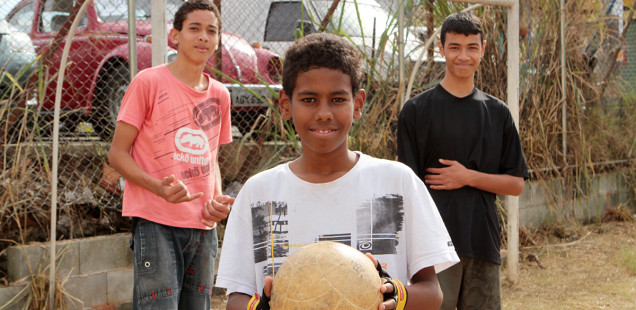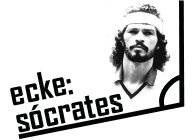
The Accomodations of Football
Seldom before German media spoke as often about Brazil being a country of antagonisms as during the past weeks. Being torn between an almost traditional passion for football and the paralyzing disenchantment already before the beginning of the »Copa da Copas«. The sheer, pure game of football, which Brazil is being so strongly associated with, marks a stark contrast to the highly commercialized show that FIFA and its sponsors will stage during the next six weeks. ecke:sócrates is on site in Brazil and experienced contradictions of this very kind during just one day.
(São Paulo)
Just a few hundred meters straight-line distance away from Corinthians Arena, the place, where the World Cup’s starting whistle will go off this Thursday, a little reccy offers itself for a kick-about. Its steppe-like pitch is sprinkled with clumps of grass, a colourfully painted wall on the one and a fence on the other side constitute its boundaries, and a lonesome Brazilian flag observes the events from atop a chimney of one of the neighbouring skyscrapers. It is ten o’clock in the morning and three boys, Vinicius, Rai and Pedro storm the field and begin immediately to slam the ball into the non-existing goal nets.
It is a special ball. Andrew Aris, a tall guy from New Zealand of the type »globetrotter« with long hair and a discreet chin beard brought it with him. He works for the charity »Spirit of Football«, whose founding fathers travelled the globe with one football each already before the last World Cups and had it signed by everyone who came across their way. This year’s ball had passed several European countries and others on the entire American continent before it returned to its origin shortly before the World Cup.
Also some of the biggest stars in the enterprise like Dani Alves, Mats Hummels and the scorer of the Uruguayan victory goal during the last World Cup in Brazil in 1950, Alcides Ghiggia, added their signature. »The Ball is like the Olympic Torch«, says Andrew. »It is a symbol for the merging process of the world.« »One Ball, one World« is the organization’s motto. Alongside the Ball’s journey it holds games and workshops, in which especially the youth shall be enabled to appreciate the thoughts of fairplay and team spirit.
It does not take a long time until the Ball, which is marked by its six-month journey and thousands of signatures, finds itself the object of a rapid match between Andrew and its two acquaintances and the three Brazilian adolescents. After the match has ended, sitting quite exhausted on the side of the pitch, the 16-year old Vinicius tells his story while a water bottle makes its round.
He is from the district of Itaquera and belongs to one of the families whose homes had to make way for the new stadium. He, therefore, would have all reasons to curse the World Cup, but he is just not able to do so: »I love football and play the game since I was a little boy. I cannot imagine anything bigger than a World Cup right in front of my door step.« As if he wants to give proof of this, he later proudly shows off several football jerseys and points to the World Cup’s match schedule on the wall of his new room. Maybe his lack of anger also has got to do with the fact that the new home that his family was granted is being located in the same district where they had lived before – a lucky coincidence not all families, who were re-settled due to FIFA’s pressure were able to enjoy.
Andrew on the other hand has studied in Erfurt and had been a FIFA employee during the 2006 World Cup. Today, however, he cannot get anything out of his former employer. »The more I learn about FIFA´s involvement in Brazil, the angrier I get«, he says. »FIFA arrives in a country, makes a fortune for a couple of weeks and leaves immediately after. What will be left are problems. They only pay lip services and initiate social marketing tricks, but do not engage in any sustainable approach. At the same time you could do great things with the stadiums e.g. transforming them into cultural centers.«
The people Andrew is criticizing and who are responsible for the displacement of the Vinicius family, are located today in the same city, just a few kilometers away. The dusk has begun when a convoy of motorcycles turns up in front of the Grand Hyatt Hotel – located in the Morumbi district. The convoy is followed by a black SUV withy shadowed windows, which show the FIFA logo as well as the license plate »001«. »Mr. Blatter´s agenda is only known by his closest staff«– says the receptionist.
Right before the start of the FIFA congress and the World Cup, the organization has been facing unprecedented pressure. The FIFA has been daily criticized regarding the World Cups in Brazil and Qatar and also internally severe dissonances have emerged. On this particular night, however, the organization seemed to have been untroubled by the negative signs. It is one big party consisting of a lot of hand shaking and big smiles everywhere. People are enjoying their drinks at the Hotel bar while a women in her mid-thirties – wearing eye-catching high heels and a jacket with a leopard pattern – is directly and discreetly escorted to the elevator by an employee of the hotel. Later on the evening, General Secretary Jerome Valcke whizzes past the crowd still standing in the hotel lobby -accompanied by appreciative backslappings – with a winning smile. The FIFA has arrived in Brazil safely, and they coming into the World Cup on a high– to stick with the football jargon.
The controversy of Brazil can be felt in only one day. A boy from a local community around the stadium had to be displaced, but still can´t wait for the World Cup to begin. A former FIFA employee is now trying to find the true spirit of football through is project to promote social change through football. And the bumpy football pitch is only a few kilometres away from the marmoreal hotel lobby. Both places accommodate football – in their own peculiar way.
Translation: Jasper Schlump & Max Oehl

